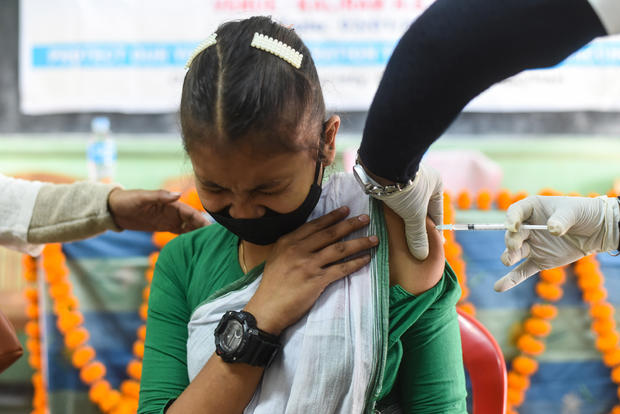Low COVID vaccination rate fuels fear that fast-growing Omicron wave could hit India hard
New Delhi — India could be in the grip of an intense third wave of coronavirus infections within weeks as cases of the new Omicron variant rise sharply. Experts estimate that the wave could peak in the middle of February, driven primarily by the highly contagious strain.
On Monday, India reported 33,750 new infections, a fraction of the number being recorded in the U.S. and many European countries, but 22% more than the previous day and the highest overall count in more than three months. Given lower vaccination rates and other factors, some experts fear the new variant could hit India harder than other countries.
The bulk of the surge is being recorded in the India’s two largest cities: the capital Delhi, and Mumbai. On Monday, the Delhi government said 84% of all samples tested in the capital on December 30 and 31 were Omicron infections.
David Talukdar/NurPhoto/Getty
The country could see its third wave peak by the middle of next month with an estimated daily case count approaching 9 million, according to projections by the U.S.-based Institute of Health Metrics and Evaluation, which takes into account cases unverified by testing.
“The peak of daily hospital admissions is expected in the first week of March, when about 33,000 hospitals beds and 7,500 ICU beds are projected to be needed,” Dr Lalit Kant, the former head of epidemiology at the Indian Council of Medical Research, told CBS News.
“India should certainly be careful to make sure that the health system is not overrun,” Dr. Ramanan Laxminarayan, founder and director of the Washington-based Center for Disease Dynamics, Economics & Policy, told CBS News.
India suffered tens of thousands of deaths and about 400,000 new infections per day at the peak of the second, Delta variant-driven wave last summer. That wave overwhelmed the country’s health care system, with hospital beds, medicine and oxygen supplies all running desperately short.
While many nations are grappling with an Omicron surge, generally the U.S. and Europe have a much higher rate of vaccinations, including booster shots, to help ward off the worst of the wave.
In India, however, only 63% of the adult population has been fully vaccinated. The country only started inoculating children between 15 and 18 years old on Monday, and booster shots won’t be available for anyone until January 10, when those over 60 will become eligible.
“The U.K. has about 70% of its population fully vaccinated, and more than 30% boosted by mRNA vaccine, which stimulates a better antibody response,” explained Dr Kant. “India has much lower vaccination numbers and no booster dose yet… besides, a higher population density in Indian cities and suburban areas is likely to drive the numbers of infected upwards.”
Dr A Fathahudeen, who heads the pulmonary and critical care department at Ernakulam Medical College in southern India, told BBC News that the low vaccination numbers combined with higher numbers of people with underlying disease in India, are worrying factors as India faces its Omicron wave.
Other experts, however, are hopeful that India’s Omicron surge will look similar to other countries, where huge increases in infections are not, thus far, bringing corresponding huge increases in hopspitalizations.
“The combination of past exposure, climbing vaccination coverage rates and low reported severity of Omicron infections should hopefully result in a more muted problem than we saw during the second wave,” Laxminarayan told CBS News.
“Fast transmissible strains like Omicron typically have high and rapid peaks, but come down quickly as well,” he said.
Several Indian states, including Delhi where the capital city is, have already reimposed restrictions including nighttime curfews and closing schools, theaters, gyms, and parks. Stricter restrictions are expected in the coming days as cases continue to rise.
“I don’t believe that lockdowns are warranted this time around, or will even be effective since the Omicron variant is highly transmissible,” Laxminarayan told CBS News.
The Indian government and public health experts continue to strongly urge the use of masks and social distancing, both of which are mandatory in all of the major cities. But violations of those rules are widespread.
Elections are looming in five of India’s states, and huge political rallies ahead of the upcoming polls have continued, with no social distancing. Politicians in Uttar Pradesh, India’s biggest state, have addressed huge crowds, with thousands of people packed tightly together without masks.
There has been no suggestion so far that the elections could be delayed.
Download our Free App
For Breaking News & Analysis Download the Free CBS News app
For all the latest Health News Click Here
For the latest news and updates, follow us on Google News.


